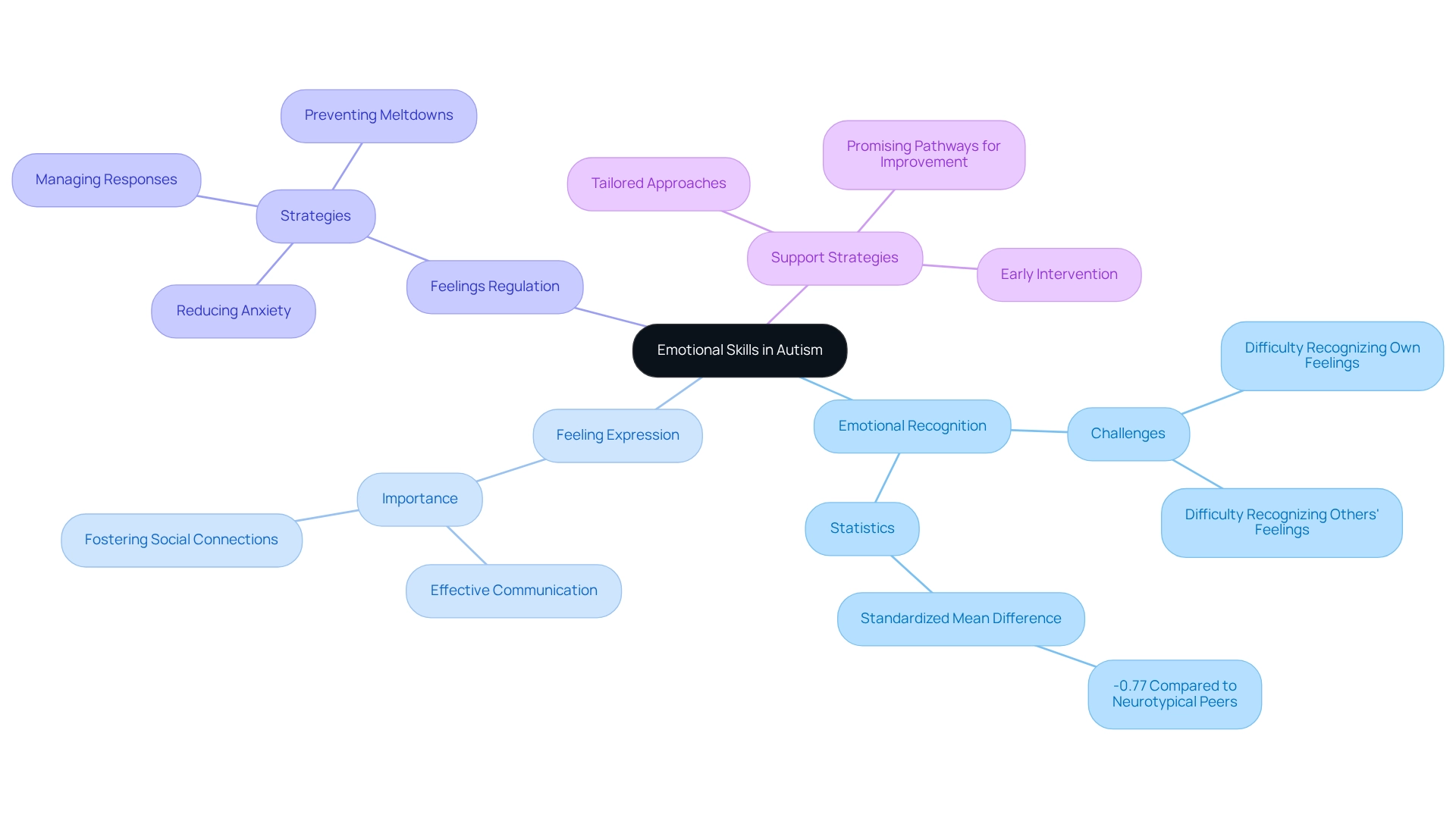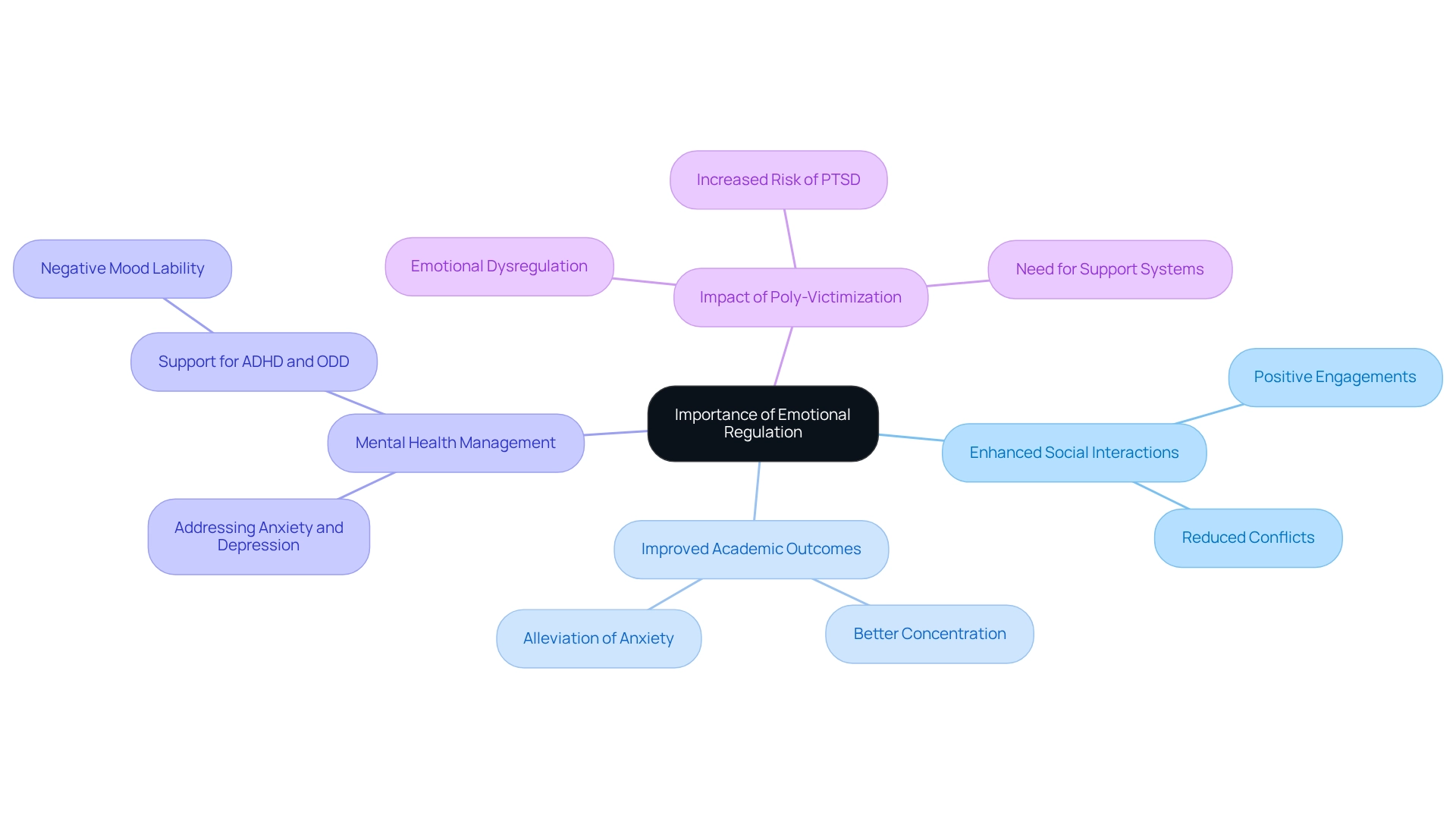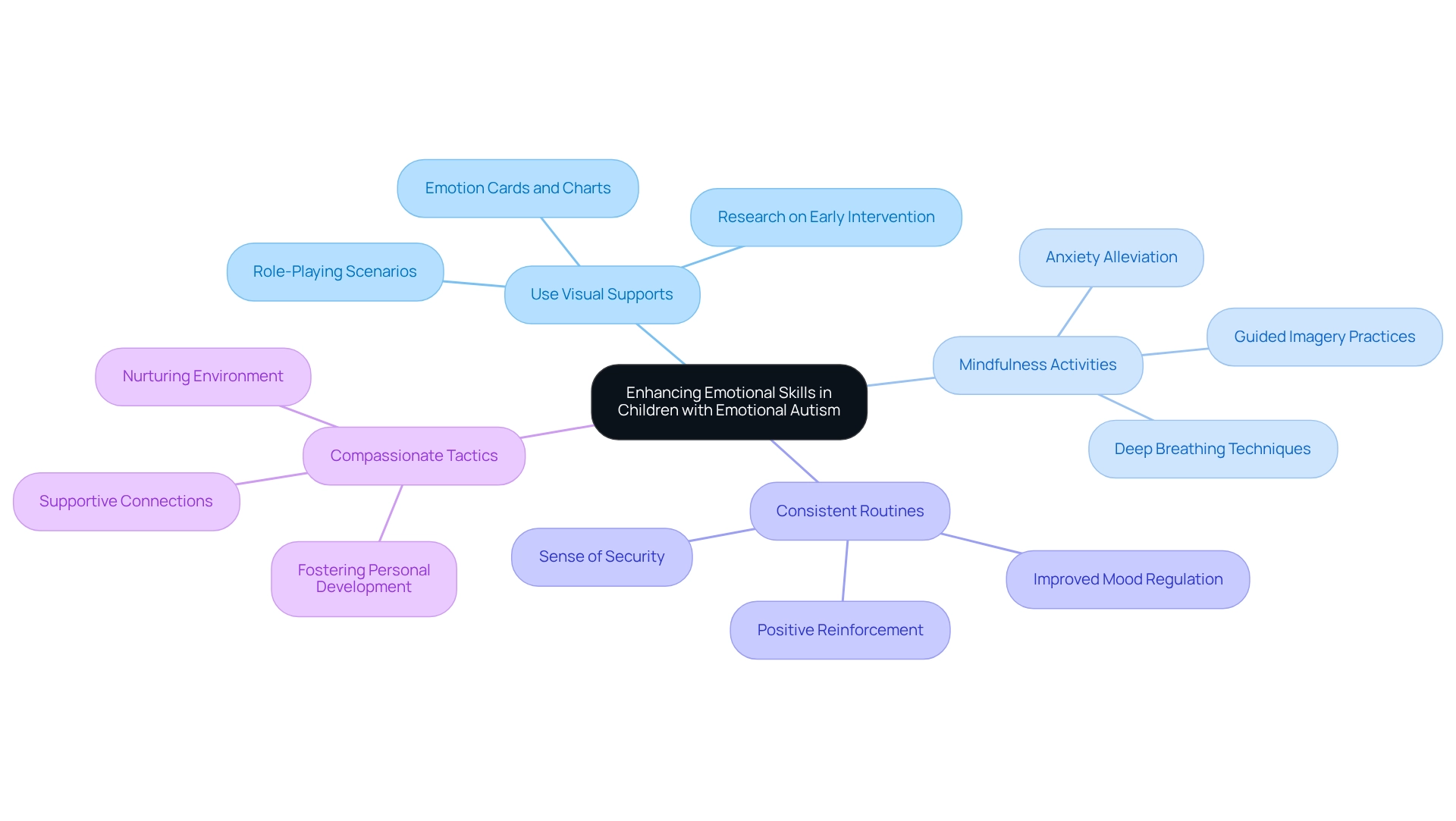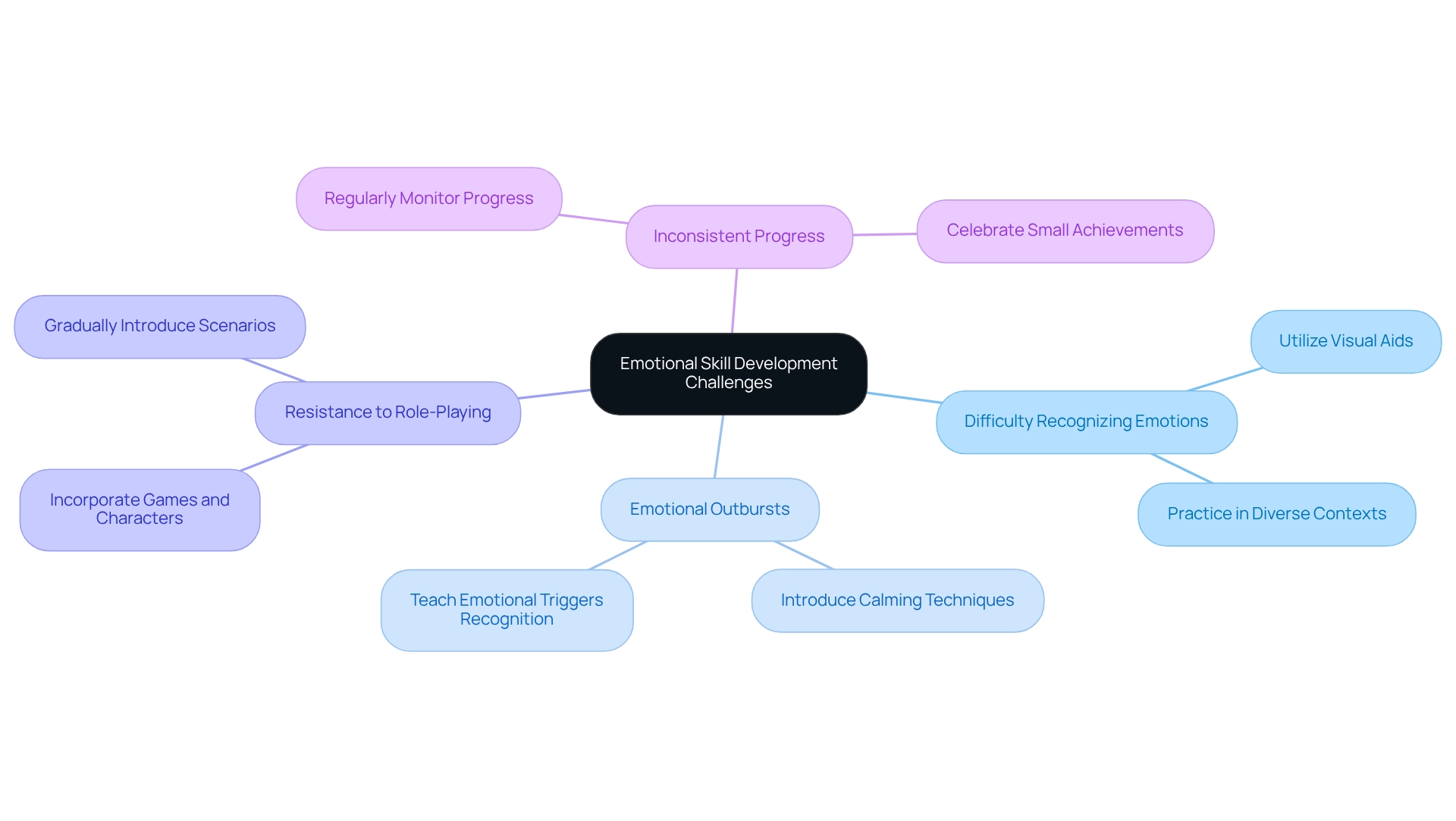Overview
This article highlights four essential steps to enhance emotional skills in children with emotional autism. By focusing on strategies such as:
- Using visual supports
- Engaging in mindfulness activities
- Establishing consistent routines
- Addressing common challenges in emotional skill development
we can make a significant difference. These approaches are not just beneficial; they are vital. They empower children to recognize and manage their emotions more effectively, while also fostering improved social interactions, academic performance, and overall well-being. This underscores the importance of tailored interventions for this unique population.
As parents, understanding these strategies can be a game-changer. Imagine your child navigating their emotions with greater ease, leading to more fulfilling interactions with peers and a more positive experience in school. It’s a journey worth embarking on together. By implementing these strategies, you’re not only supporting your child’s emotional growth but also nurturing their potential for success in various aspects of life.
Let’s take action together. Consider exploring these strategies further and think about how you can incorporate them into your daily routine. Your involvement is crucial, and by doing so, you’re taking an important step towards fostering an environment where your child can thrive emotionally and socially.
Introduction
In a world where emotional intelligence is increasingly recognized as a cornerstone of personal and social success, children with autism often encounter unique challenges in developing these essential skills. For these children, understanding and managing emotions can be particularly daunting, significantly impacting their social interactions and overall well-being. This article delves into the intricacies of emotional skills in autism, exploring the critical components of emotional recognition, expression, and regulation.
Emotional regulation is not just vital for fostering positive relationships; it also enhances academic performance and mental health. Imagine the difference it could make in a child's life when they can effectively express their feelings and understand those of others. Practical strategies and solutions are offered here to navigate common obstacles in emotional skill development. Tailored interventions are emphasized as key to empowering children on the autism spectrum.
Through this exploration, we aim to shed light on the vital role that emotional skills play in the lives of children with autism. We hope to provide pathways to support their growth, encouraging parents and caregivers to engage in this journey and share their experiences with us.
Define Emotional Skills in Autism
Individuals on the spectrum exhibit emotional autism, which encompasses the ability to recognize, understand, and manage emotions effectively. For many children with emotional autism, recognizing their own feelings and those of others can be a significant challenge, often resulting in difficulties in social interactions. This struggle is further complicated by the reality that families of autistic individuals frequently face lower average incomes than those of non-autistic individuals, adding additional stressors to their daily lives.
Understanding these essential elements of emotional autism competencies can help parents and professionals provide the necessary support. Research indicates that individuals with emotional autism may encounter considerable challenges in this area, often performing significantly poorer on emotion recognition tasks compared to their neurotypical peers, with a standardized mean difference of -0.77.
As Boya Li points out, this raises an important question: could the recognition of feelings among autistic youth be hindered by their difficulties in processing facial information, particularly in cases of emotional autism?
Feeling Expression involves the ability to convey sentiments appropriately, whether verbally or non-verbally. Mastery of expressing feelings is vital for promoting effective communication and fostering social connections, particularly in individuals experiencing emotional autism, as feelings regulation is the ability to manage responses to various situations, which is crucial for reducing anxiety and preventing meltdowns.
Implementing effective strategies for regulating emotions can lead to more positive outcomes in social environments and enhance overall well-being, particularly for children with emotional autism. By comprehending these attributes, parents and professionals can better identify the specific challenges faced by children with emotional autism, allowing them to tailor their approaches and interventions accordingly.
Recent studies highlight that while autistic children may initially struggle with social skills, there is a promising pathway for improvement as they age. Comparative analyses demonstrate that individuals with ASD can enhance their emotion recognition abilities over time. This underscores the importance of early intervention and supportive programs in fostering personal development, paving the way for a brighter future.

Explain the Importance of Emotional Regulation
Affective regulation is the ability to manage and respond to feelings in a constructive manner. For children with emotional autism, mastering emotional regulation is essential for several key reasons.
Firstly, enhanced social interactions are a significant benefit. Children who effectively regulate their emotions are more adept at engaging in positive social interactions. This skill reduces the likelihood of conflicts and misunderstandings, fostering healthier relationships with peers.
Secondly, emotional regulation plays a crucial role in a young person's capacity to concentrate and learn within educational settings. By managing feelings of frustration and anxiety, young learners can focus better on their studies, leading to improved academic outcomes. Moreover, cultivating regulation abilities is essential for alleviating prevalent mental health challenges like anxiety and depression, which are frequently seen in youngsters diagnosed with emotional autism. For instance, individuals with ADHD and comorbid ODD exhibit considerably greater negative mood lability compared to those without ODD, emphasizing the significance of affect regulation in this context. By providing young ones with these abilities, parents and specialists can assist them in managing psychological challenges more effectively.
Furthermore, studies show that poly-victimization can greatly affect affective regulation and mental health results in young individuals. This indicates that youngsters who undergo various forms of victimization are more prone to developing affective dysregulation. This highlights the importance of thorough support systems for individuals experiencing emotional autism.
Promoting self-regulation not only improves a young person's quality of life but also enables them to navigate social settings with increased confidence and success. As Xu, W. observed, the effectiveness of applied behavior analysis program training on improving the emotional-social abilities of autistic individuals is vital. Youngsters who have cultivated these abilities frequently exhibit noteworthy enhancements in their social engagements and general well-being, highlighting the deep influence of self-regulation on their lives.

Implement Strategies to Enhance Emotional Skills
To enhance emotional skills in children with emotional autism, consider implementing the following nurturing strategies:
- Use Visual Supports: Visual aids, such as emotion cards or charts, serve as effective tools for helping children identify and express their feelings. For instance, a feelings chart can assist them in recognizing emotions like happiness, sadness, or anger, thereby deepening their understanding of feelings. Research indicates that early intervention and tailored approaches can bolster resilience and promote positive social interactions, particularly for children with emotional autism, highlighting visual supports as a vital component of personal development. Role-playing scenarios that engage children in simulated social circumstances can significantly enhance their responses and interpersonal skills. This method provides a safe environment for them to practice appropriate reactions, fostering resilience and independence. A case study on how ABA therapy supports functional communication in young individuals underscores the effectiveness of such interactive strategies in improving social skills.
- Mindfulness Activities: Integrating mindfulness techniques, such as deep breathing or guided imagery, can help children manage their emotions more effectively. These practices not only alleviate anxiety but also promote greater awareness of feelings, which is essential for social interactions.
- Consistent Routines: Establishing regular patterns offers a sense of security for children, making it easier for them to navigate emotions during transitions or unexpected changes. Consistency in daily activities can lead to improved mood regulation and stability. As one educator noted, positive reinforcement is crucial for children with emotional autism, as they often face challenges in engaging with the same social groups as their peers. This observation highlights the importance of supportive connections within educational settings.
By incorporating these compassionate tactics into everyday life, caregivers and professionals can cultivate a nurturing environment that fosters personal development, ultimately enhancing the overall well-being of individuals on the spectrum.

Troubleshoot Common Challenges in Emotional Skill Development
Improving social abilities in youngsters with developmental disorders can be challenging for many parents. Understanding these challenges is the first step toward fostering growth and connection. Here are some common issues along with effective strategies to address them:
-
Difficulty Recognizing Emotions
Solution: Utilize consistent and clear visual aids to assist children in identifying emotions. Regular practice in diverse contexts, such as during storytime or while watching movies, can reinforce their understanding. It's important to remember that 91% to 100% of youths with pervasive developmental disorder (PDD) diagnoses from DSM-IV retained their diagnosis under the ASD category using DSM-5. This highlights the prevalence of autism and the necessity of addressing social skills in this population. -
Emotional Outbursts
Solution: Introduce calming techniques like deep breathing exercises or sensory breaks when a child exhibits signs of distress. Teaching them to recognize their emotional triggers can significantly reduce the frequency of outbursts. -
Resistance to Role-Playing
Solution: Transform role-playing into an enjoyable activity by incorporating games or their favorite characters. Gradually introduce scenarios and allow the young one to take the lead, which can enhance their comfort and engagement. -
Inconsistent Progress
Solution: Regularly monitor progress and be prepared to adjust strategies as necessary. Celebrating small achievements can motivate the child and reinforce positive behaviors.
As Temple Grandin once stated, 'What would occur if the gene linked to neurodiversity was removed from the gene pool? You would have a bunch of people standing around in a cave, chatting and socializing and not getting anything done.' This perspective underscores the unique contributions of individuals on the spectrum and the importance of nurturing their interpersonal abilities.
By proactively addressing these challenges with tailored strategies, parents and professionals can effectively foster emotional autism skill development in children. This approach ultimately leads to improved emotional regulation and social interactions. Community engagement also plays a crucial role in this process. For instance, the case study titled "The Role of Community in Autism Awareness" illustrates how community involvement fosters greater visibility and understanding of autism-related challenges, creating a supportive environment for individuals on the spectrum. Let's work together to ensure our children thrive in their social worlds.

Conclusion
The development of emotional skills in children with autism is vital for enhancing their overall well-being and social interactions. By emphasizing emotional recognition, expression, and regulation, parents and professionals can provide these children with essential tools to navigate their emotions and relationships more effectively. Early intervention and tailored strategies, such as visual supports, role-playing, and mindfulness activities, can significantly boost emotional literacy and resilience. This, in turn, leads to improved academic performance and better mental health outcomes.
Moreover, addressing common challenges in emotional skill development is crucial for creating an environment where children with autism can truly thrive. By implementing consistent routines and employing calming techniques, caregivers can help reduce emotional outbursts and foster positive emotional responses. Celebrating small achievements and adjusting strategies as needed can further nurture their growth and development.
In conclusion, empowering children with autism to cultivate emotional skills not only enriches their quality of life but also fosters greater confidence in social settings. The collective effort of parents, educators, and the community is essential in building a supportive framework that nurtures these skills. As awareness and understanding of autism continue to evolve, so too does the potential for these children to flourish, contributing uniquely to society while forging meaningful connections with others.
Frequently Asked Questions
What are emotional skills in individuals with autism?
Emotional skills in individuals with autism refer to the ability to recognize, understand, and manage emotions effectively. This includes recognizing their own feelings and those of others, which can be challenging for many children on the spectrum.
What challenges do individuals with emotional autism face?
Individuals with emotional autism often struggle with recognizing emotions, which can lead to difficulties in social interactions. They may perform significantly poorer on emotion recognition tasks compared to neurotypical peers.
How does emotional autism affect family dynamics?
Families of autistic individuals frequently experience lower average incomes than those of non-autistic individuals, which can add additional stressors to their daily lives.
What is the importance of feeling expression in emotional autism?
Feeling expression is crucial for effective communication and fostering social connections. Mastery of expressing feelings helps individuals with emotional autism manage their responses to various situations, reducing anxiety and preventing meltdowns.
How can effective emotion regulation strategies benefit individuals with emotional autism?
Implementing effective strategies for regulating emotions can lead to more positive outcomes in social environments and enhance overall well-being, particularly for children with emotional autism.
Can individuals with autism improve their emotion recognition skills over time?
Yes, studies indicate that while autistic children may initially struggle with social skills, there is a promising pathway for improvement as they age, highlighting the importance of early intervention and supportive programs.
What role do parents and professionals play in supporting individuals with emotional autism?
By understanding the challenges faced by children with emotional autism, parents and professionals can tailor their approaches and interventions, providing necessary support for their emotional development.




